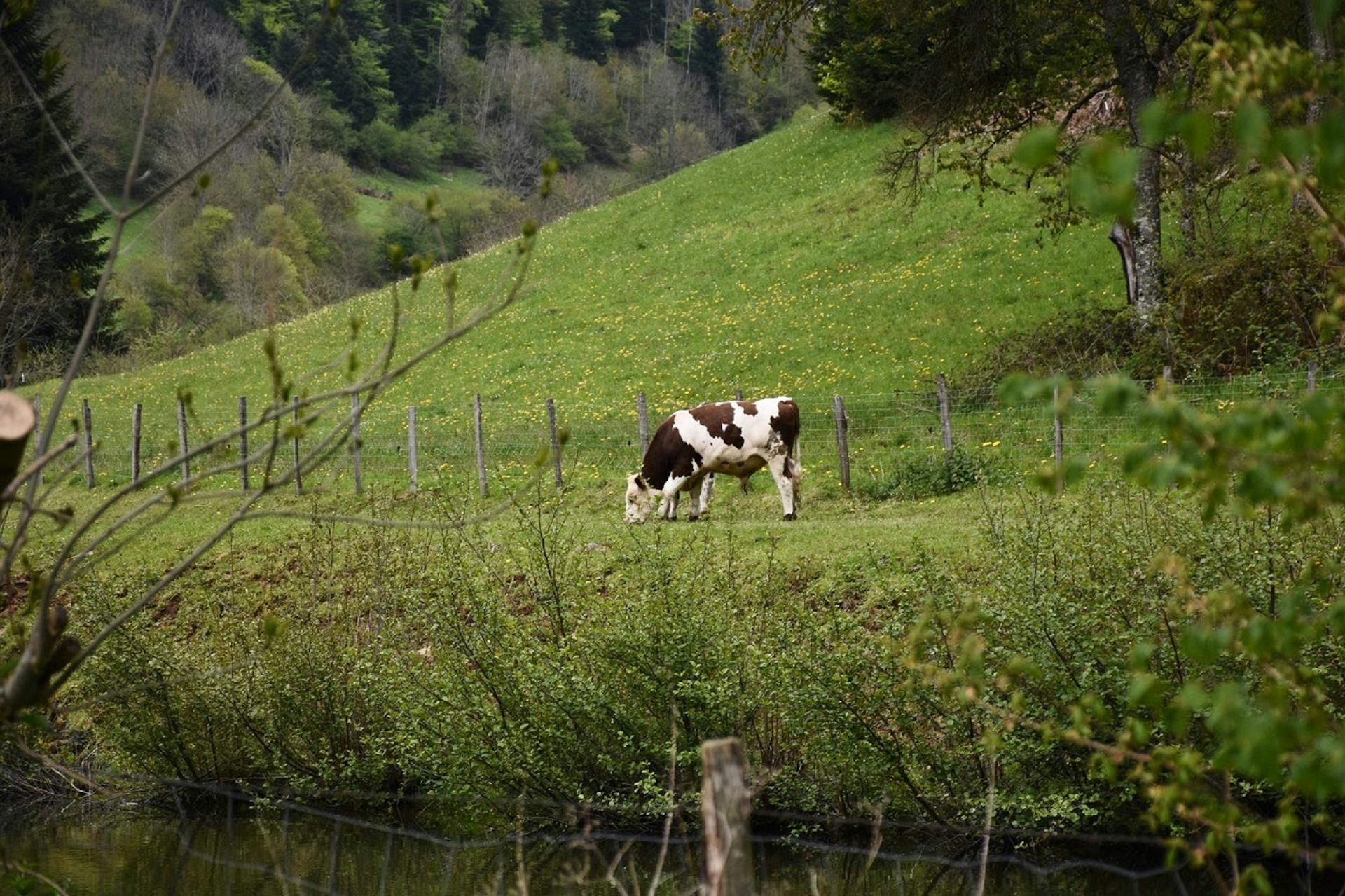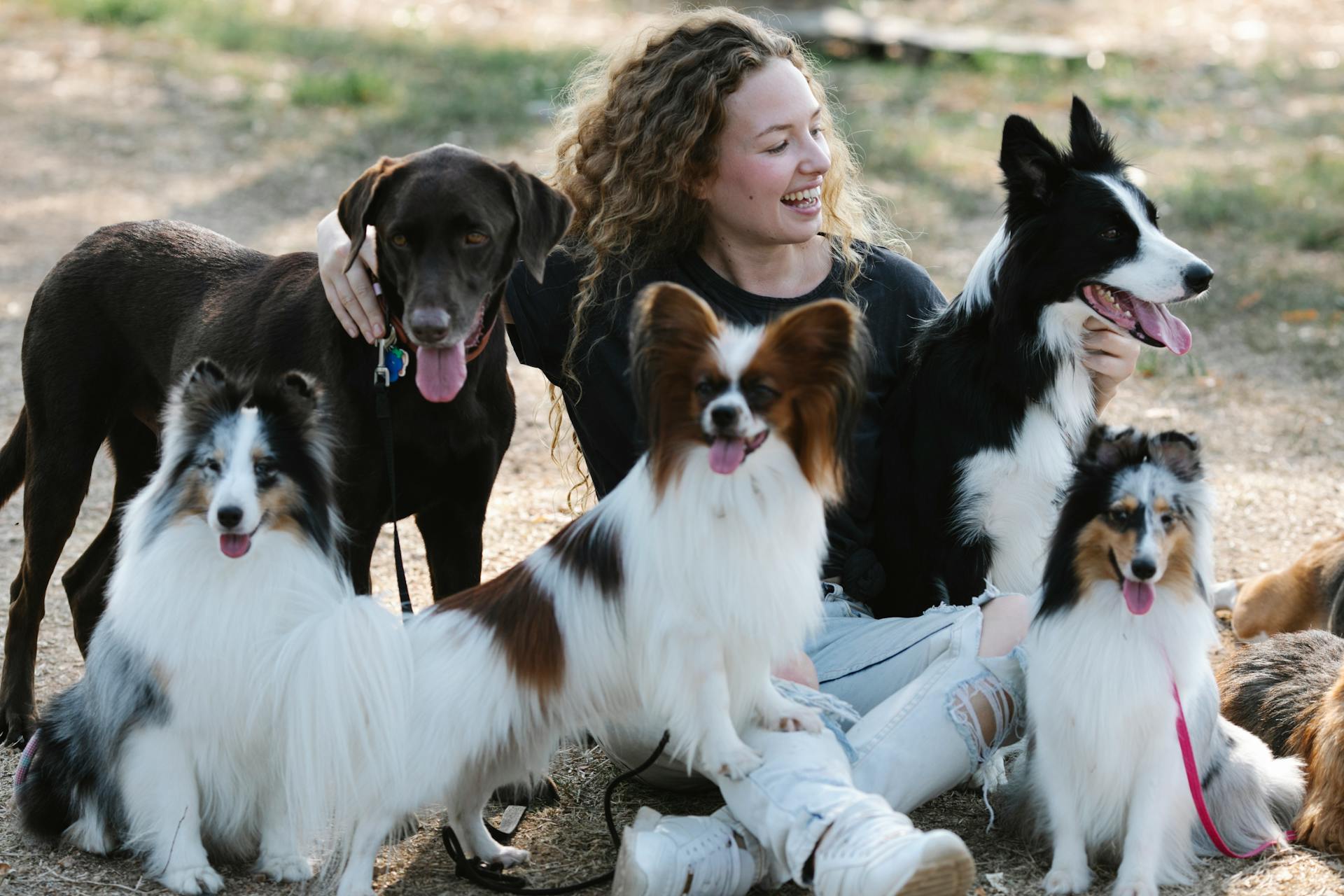
Traveling to France with your furry friend can be a wonderful experience. France is a dog-friendly country, with many accommodations, transportation options, and activities that welcome dogs.
Pet-friendly accommodations are plentiful in France, with many hotels, gîtes, and vacation rentals allowing dogs. Some popular pet-friendly destinations include Paris, the French Riviera, and the Loire Valley.
Dogs are allowed on many public transportation options in France, including trains, buses, and taxis. However, some trains have specific pet-friendly cars, so it's best to check in advance.
With so many dog-friendly activities, you and your pup can enjoy exploring France together.
For your interest: Dogs from France
Traveling to France with Dogs
Taking your dog to France is relatively easy, as long as you follow the necessary steps. The rules for dogs visiting France are the same as for dogs travelling to the rest of the EU.
To bring your dog to France, you'll need to microchip them, vaccinate for rabies, and wait at least 21 days. An EU pet health certificate is also required, unless you're travelling from elsewhere in the EU, in which case you can use an EU pet passport.
Restrictions apply to some "dangerous" dog breeds visiting France, so be sure to check the specific rules.
Entry Requirements
Traveling to France with dogs is a relatively straightforward process, but it's essential to meet the entry requirements to avoid any issues. Your dog must be identifiable with a chip, which is a must-have for travel.
To ensure a smooth journey, your dog's pet ID must be present, and they must have a current rabies vaccination. It's also crucial to check your dog's ID card before traveling to refresh their vaccinations if necessary.
Dogs must be at least 15 weeks old to travel abroad due to the rabies vaccination requirements. This ensures the vaccination protection is fully developed.
Here are the entry requirements for dogs in France at a glance:
- Dog must be identifiable (chip)
- Pet ID must be present
- Current rabies vaccination
- Minimum age 15 weeks
- No more than 5 dogs
- Dogs of the following breeds are not allowed to enter France: American Staffordshire Terrier, Mastiff, Tosa inu, Rottweiler
Transportation and Accommodation
When traveling to France with your dog, finding the right accommodation can be a challenge. A wide variety of accommodation in France is dog-friendly, from hotels to B&Bs to Gîtes to campgrounds.
In my investigation, I found that 50% of hotels in Nice and 37% of hotels in Paris allow dogs. Many chain hotels located on the outskirts of cities are quite affordable and dependable, plus allow dogs, including Ibis, B&B, and Campanile.
Prices for dog-friendly accommodations can vary, but usually range from around €50 per night, not including breakfast, with an extra charge of around €5-10 for a dog.
If you're looking for a more luxurious experience, many fancy hotels also welcome dogs, but be prepared for a higher price tag.
Here are some tips for booking dog-friendly accommodations in France:
- Book among the QUALIDOG-labeled accommodation for your holidays
- Search for a hotel or accommodation “ok dog” on Booking
- Find unusual dog-friendly accommodation on Abracadaroom
Pet Leash Requirements
Traveling with pets can be a challenge, and understanding local leash requirements is a must. France does not have a general leash requirement, but regions may impose location-specific leash requirements.
You'll want to keep an eye out for signs in nature reserves, city centers, or on beaches. Some areas may require your dog to be on a leash.
Just pay attention to the signs and you'll be fine.
Using Public Transport
In Paris, small dogs are allowed on all forms of public transport, including buses, metro, RER trains, trams, and funiculars, for free, as long as they're carried in a bag or container no larger than 45cm. However, larger dogs are only allowed on the metro and RER trains, and must be leashed and muzzled.
You can get away with travelling with a small dog on your lap without a bag in Paris, as long as they're genuinely small and not making a nuisance. We've done this with our dog on the metro and seen other small dogs on laps with no issues.
Larger dogs require a ticket, while smaller dogs in a carrier are exempt, according to the rules for other cities in France. In some cities, only small dogs in a bag or basket are allowed on public transport.
In Bordeaux, dogs must be leashed or transported in a basket, and larger dogs require a ticket, while smaller dogs in a carrier are exempt. The rules usually include terms that the dogs cannot make any mess or inconvenience other passengers.
If taking long distance trains in France, all sized dogs are allowed, except for the Eurostar to London. Smaller pets should travel in a pet carrier no larger than 45cm x 30cm x 25cm, placed on your knees or at your feet.
A set fee of €7 is charged for both small and larger dogs on trains, except on some routes where a higher fee of €20 is charged for larger dogs.
See what others are reading: Merrick Dog Food for Small Dogs
Accommodation
Accommodation in France is quite welcoming to dogs. In fact, 50% of hotels in Nice and 37% of hotels in Paris allow dogs.
You can find a wide variety of dog-friendly accommodation in France, from hotels to B&Bs to Gîtes to campgrounds. Many chain hotels on the outskirts of cities are affordable and dependable, and they welcome dogs. These hotels, such as Ibis, B&B, and Campanile, usually charge around €50 per night, not including breakfast, with an extra charge of around €5-10 for a dog.
Some hotels, even fancy ones, will treat your dog like royalty, but be prepared for a higher price tag. If you're looking for a more affordable option, consider booking a hotel that's not directly in the city center.
If you want to ensure that your accommodation is dog-friendly, look for the QUALIDOG label. This certification guarantees that the accommodation has a pet-friendly policy. You can find a selection of QUALIDOG-certified accommodation on the official website.
Here are some ways to find dog-friendly accommodation in France:
- Book among the QUALIDOG-labeled accommodation for your holidays
- Search for a hotel or accommodation “ok dog” on Booking
- Find unusual dog-friendly accommodation on Abracadaroom
- Find an “ok dog” campsite for your stay
Regions and Destinations
France has countless regions perfect for holidays with dogs, offering a mix of relaxation, hiking, and activities for all.
Provence is a standout destination, boasting pretty mountain villages, vast landscapes, and tranquil atmosphere. We've explored Provence extensively, visiting Haute-Provence and the Luberon, and can attest to its charm.
The French Atlantic coast is another great option, featuring endless pine forests, wild beaches, and a relaxed atmosphere. It's a perfect spot for a vacation with dogs, offering a balance of peace and action.
Normandy is a must-visit destination for dog owners, with its gastronomy, sea, nature, and countryside on offer. It boasts the most dog-friendly beaches in France, including pebble and fine sand beaches, and plenty of hiking trails and activities to keep dogs entertained.
The Somme region in Picardy is a 100% dog-friendly destination, offering history, culture, pretty towns, and a range of activities for dogs. The Baie de Somme is one of the most beautiful bays in the world, and there are plenty of dog-friendly beaches, walks, and bird sanctuaries to explore.
Corsica
Corsica is a paradise for dogs and their owners. The island offers breathtaking landscapes, dream beaches, and mountains to explore. It's the perfect place to spend your holidays with your furry friend.
You can find many dog-friendly beaches on the island, where your dog can run and play freely. The GR20 hiking trail is also a must-do, offering stunning sea views and an unforgettable adventure with your dog.
If you're planning to visit Corsica with your dog, make sure to book your crossing on board Corsica Ferries, as they accept dogs on board. It's also a good idea to bring your dog's favorite toys and treats, as well as a dog life jacket, just in case.
Here are some dog-friendly activities to do on the island:
- Hike the GR20 with your dog
- Explore the dog-friendly beaches
- Take a canoe trip with your dog at Lokayak
- Visit the Calanches de Piana, a UNESCO World Heritage Site
With its stunning landscapes, delicious food, and dog-friendly activities, Corsica is a must-visit destination for dog owners. So pack your bags, grab your dog, and get ready for an unforgettable adventure on the beautiful island of Corsica.
Holiday in Provence
Provence is my favorite region for a vacation with dogs in France. Everything fits here.
The pretty mountain villages, vastness, and tranquility of Provence make it an ideal destination. We have explored Provence extensively, visiting Haute-Provence, which is best known for the breathtaking Verdon Gorge. The Luberon region is also a must-see, with its most beautiful villages.
To experience the beauty of Haute-Provence and the Verdon Gorge with your dog, consider traveling there. The same goes for the Luberon region, which is perfect for a holiday with dogs.
Nîmes is a charming city that welcomes dogs, but if you're looking for a more laid-back experience, Provence is the way to go.
Franche-Comté and Jura
If you're looking for a mountain destination with fewer tourists, consider Franche-Comté and Jura. This region is perfect for outdoor activities with your dog.
You can engage in dog-biking, cani cross, cani-canoe, cani-paddle, and many other sporting outings in the midst of nature. Exercising with your dog is a big part of the culture here.
Lake Chalain, The Ilay Lake, and Poudrey chasm are must-visit spots. The famous Hedgehog waterfalls are also a highlight.
The region's unique landscape offers a mix of vineyards, mid-mountains, natural lakes, mountains, and green plains. This diversity makes it an ideal destination for dog owners who love the outdoors.
Millau and Aveyron
Millau and Aveyron are a perfect destination for outdoor enthusiasts and families with dogs. This region is ideal for hiking with your dog, canoeing with your dog, and snorkeling with your dog.
You can hike on the Larzac ledges, a great spot for a family adventure. The Gorges du Tarn is another must-visit, where you can descend by canoe or paddleboard with your dog.
The Millau Viaduct is an architectural masterpiece that's definitely worth a visit. It's an exceptional site that's sure to leave a lasting impression.
Planning and Preparation
Before embarking on your French adventure with your furry friend, it's essential to research the country's pet-friendly accommodations and activities.
Pet-friendly hotels and gites are widely available in France, but it's crucial to book in advance to ensure availability, especially during peak travel seasons.
To ensure a smooth journey, consider investing in a suitable dog carrier or crate that meets French regulations, which require pets to be secured in a carrier during car travel.
A fresh viewpoint: Best Vehicle to Travel Cross Country with Dogs
Travel Diseases: Leishmaniasis Areas

When traveling to France with your dog, it's essential to be aware of the regions with a high risk of leishmaniasis. Leishmaniasis is a widespread disease in France, particularly in the region from the Ardèche and Drôme in the north to the entire Mediterranean coast.
This area has the highest risk of leishmanosis for your dog. The same applies to the other Mediterranean diseases, such as heartworm, babesiosis, and Ehrlichiosis.
Ticks can transmit Lyme disease, anaplasmosis, babesiosis, and Ehrlichiosis in all regions of France, not just the Mediterranean coast.
Paperwork for Taking
To take your dog from the US to France, you'll need to obtain a health certificate. The type of certificate you need depends on the number of pets traveling and the circumstances of your trip. If you're traveling with 5 or fewer pets, you can use the "non-commercial" health certificate.
This certificate is valid for 30 days after it's issued by an Accredited Veterinarian. You'll also need to have it endorsed by the USDA within 10 days of arriving in the EU.
Worth a look: What Nutrients Do Dogs Need in Homemade Dog Food

If you're traveling with 6 or more pets, or if you can't travel with your pet within 5 days of its departure, you'll need to use the "commercial" health certificate. This certificate must be issued by an Accredited Veterinarian and endorsed by the USDA within 48 hours of departing the US.
You'll also need to ensure your dog has an implanted chip and a recent vaccination document, attested to by the US Department of Agriculture (USDA). This can be a hassle, but it's worth it to avoid any issues with your dog's travel.
Here's a quick rundown of the paperwork you'll need:
- Health certificate (either "non-commercial" or "commercial")
- Endorsement by the USDA
- Implantable chip
- Recent vaccination document
- EU pet passport (optional, but recommended to save time and money)
Note that some breeds of dogs are classified as "dangerous" in France and may face restrictions or prohibitions on public transport or flying French airlines. Be sure to check the rules if you're planning to travel with a dog that falls into one of these categories.
Advantages of Taking
Traveling with your dog can be a great way to break the ice and make friends. For example, Ellie's best friends in Nice are a bichon and a Jack Russell, both of whom have become friends with their owners, who have become friends with me as well.
Here's an interesting read: How to Become a Dog Trainer for Service Dogs

Dogs have a way of bringing you into the local culture, and in France, shopkeepers often know and chat with you and your dog. The tabac and charcuterie in Ellie's neighborhood know her and give her treats.
Being seen as a local rather than a tourist can make a big difference in your experience. In Paris, I was once hesitant to be seated at a brasserie, but when I said "J'ai un chien" and pointed out Ellie, we received friendly service and were even invited to sit at a choice table.
Traveling with your dog can also make you feel more connected to the community. I've had long conversations with the vet about politics and with other dog owners about potential health hazards, such as the pine processionary caterpillars that throw poisoned stingers.
Overall, traveling with your dog can be a wonderful way to experience a new culture and make connections with the people around you.
Dining and Shopping
Dining out in France with your dog is a breeze, as most restaurants and cafes allow dogs to join diners, both inside and out on the terrace.
If you want to dine inside with your dog, it's polite to ask first, unless you see other dogs dining inside.
Sitting outside on the typically large terraces is usually a better option if the weather is sunny or your dog doesn't have the best manners.
We found that over three visits to France, there's only one time that our dog wasn't allowed: sitting outside a kebab shop in Strasbourg.
Shopping in France with a dog is best done at small boutiques directly on the streets and pedestrian precincts.
Some shopping centres allow dogs in France, but not all, so it's best to check beforehand.
Dogs are not allowed in supermarkets, so plan your shopping trip accordingly.
Dining Out
Dining out in France is a breeze with your furry friend by your side. Most restaurants and cafes allow dogs to join diners, both inside and out on the terrace.
You'll often find large terraces perfect for dining with your dog, especially on sunny days. If you'd rather dine indoors, it's polite to ask first, unless you see other dogs dining inside.
Over three visits to France, there's only one time that our dog wasn't allowed: sitting outside a kebab shop in Strasbourg. We took advantage of the cheaper lunchtime set menus at many restaurants around the country.
These set menus are a great value and can be found at many restaurants, making dining out with your dog a cost-effective option. You can also grab delicious baguette sandwiches at wonderful French bakeries.
Some bakeries, like the Boulangeries Feuillette chain, have both outdoor and indoor seating, and our dog was allowed to join us inside at multiple branches. These bakeries are a great spot to enjoy a coffee and pastry.
Restaurants that don't want dogs inside often have a corresponding sign on the door, so you can plan ahead. We've gotten into the habit of asking if it's okay for our dog to come in with us, especially when eating indoors.
Shopping

Shopping is a breeze with your furry friend in tow, as long as you know where to go. Visiting small boutiques directly on the streets and pedestrian precincts is a great idea.
Some shopping centres in France allow dogs, but it's essential to check beforehand to avoid any disappointment.
Shopping centres that do allow dogs are a great option, but remember to check their policies first.
Sightseeing and Activities
You'll be happy to know that France has plenty of dog-friendly sightseeing options. Many famous Châteaux in the Loire Valley permit dogs on their grounds, and Chenonceau even allows small dogs to be carried inside.
However, it's essential to check the rules at each individual tourist destination, as some places like Versailles and Fontainebleau prohibit dogs from their formal gardens. France is also not the best destination for visiting beaches with your dog, especially during the warmer months.
Most beaches in France do not allow dogs from mid-June to the end of September, and some beaches that do permit dogs restrict them to before 8am and after 8pm.
Sightseeing and Activities
The Loire Valley is a must-visit destination for dog owners, with many châteaux allowing leashed dogs on their grounds.
Château de Chambord is one of the largest châteaux in the region and allows dogs on its extensive grounds, but not inside the château or formal gardens.
Chenonceau is an extra dog-friendly château, allowing dogs inside the ticketed area and formal gardens, and even small dogs inside the building, as long as they're carried or in a bag.
Versailles is a different story, with dogs prohibited from the formal gardens.
Fontainebleau also doesn't allow dogs in the formal gardens.
France has some dog-friendly beaches, but they're restricted to before 8am and after 8pm during the warmer months.
Visit Luxembourg Gardens in Paris
The Luxembourg Gardens in Paris are a must-visit destination for any dog owner. Dogs are allowed in the southeast corner of the park, through two gates, which are clearly indicated.
This park is home to a gorgeous palace, now home to the French Senate, a large pond, and plenty of famous statues to track down. The Luxembourg Gardens offer a unique and enjoyable experience for both you and your furry friend.
6. Stroll Along The Nice Waterfront
The Promenade des Anglais is a must-visit spot in Nice, running for 7km along the beach from the port area to the airport.
This scenic promenade is perfect for a leisurely stroll, especially on sunny days when you can stop for an ice cream along the way.
Just be aware that it can get hot even in April, so make sure the pavement isn't too hot for your dog's feet or wear booties to protect them.
Alternatively, consider strolling in the evening when the temperature cools down.
If you're traveling with your furry friend, Nice is one of the few dog-friendly destinations in France, with two beaches allowing dogs: Lenval and La Lanterne.
However, be sure to keep your dog on a leash and avoid other beaches in the area where dogs are not allowed.
Additional reading: Raw Dog the Naked Truth about Hot Dogs
Frequently Asked Questions
Can I fly with my dog in the cabin to Paris?
To fly with your dog in the cabin to Paris, check if your pet meets the airline's weight and carrier size limits, typically 8kg and 115cm (L+W+H). Contact the airline for specific requirements and regulations.
Sources
- https://www.dirtypawstravel.de/l/holidaying-with-your-dog-in-france/
- https://www.travelnuity.com/dog-friendly-france/
- https://thegoodlifefrance.com/the-pros-and-cons-of-taking-your-dog-to-france-from-the-us/
- https://www.aphis.usda.gov/pet-travel/us-to-another-country-export/pet-travel-us-france
- https://emmenetonchien.com/en/destinations-voyage-avec-un-chien/ou-partir-en-vacances-avec-son-chien-en-france/
Featured Images: pexels.com


